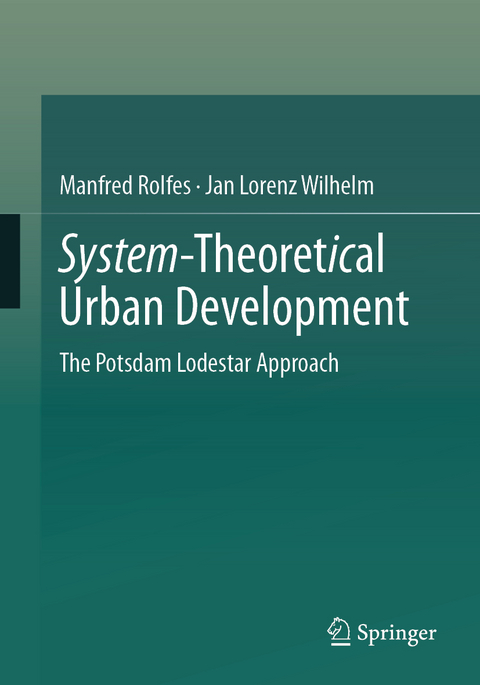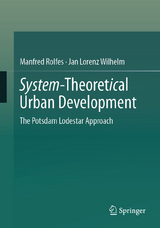System-Theoretical Urban Development
Springer Fachmedien Wiesbaden GmbH (Verlag)
978-3-658-42249-3 (ISBN)
In their book, the authors introduce the topic of urban development from a systems (theoretical) perspective and provide explanatory approaches, tips and methodological instructions for dealing with urban complexity. Knowing full well that this sometimes amounts to squaring the circle, the authors draw on applied systemic approaches and systematically couple these with epistemological currents that can be assigned to Luhmann's systems theory. The social understanding of this theory of social systems represents a very good starting point for understanding urban development and urban complexity. From this perspective, urban development can be seen as a process in which organisations and individuals with their own expectations and perspectives are involved, in which contradictions and conflicts seem inevitable and the future cannot be clearly predicted. Decisions in cities and municipalities are therefore always associated with risks, irritations and unexpected consequences. With the Potsdam lodestar approach, Rolfes and Wilhelm present a multidimensional approach to managing urban development processes. The approach distinguishes five process dimensions, which are presented chapter by chapter and linked with recommendations. The individual chapters are structured along guiding questions and feature appealing visualizations and numerous bonus materials.
lt;p>Dr. Manfred Rolfes is Professor of Applied Human Geography and Regional Science at the University of Potsdam.
Dr. Jan Lorenz Wilhelm is a systemic coach and systemic consultant and works as a research assistant at the Institute for Environmental Sciences and Geography at the University of Potsdam.
Introduction.- Urban development and urban complexity.- Urban development.- Task areas of cities and municipalities.- New tasks and communication structures (in) the municipality.- Challenges and problem orientation of politics and administration in the municipality.- Overall social trends and urban development.- Complexity in urban development.- Conclusions.- System(theoret)ic approaches in urban development: development history, perspective and basic positions.- The systemic approach and its system-theoretical background.- System-theoretical insights and core ideas.- Development history of the systemic approach.- City and urban development from a more theorizing perspective.- City and urban development from a more application-oriented perspective.- Self-understanding and basic positions of system(theoret)ic approaches in urban development. City from a systems (theoretical) perspective.- City and urban development from a more theoretical perspective.- City and urban development from a more applied perspective.- Self-conception and basic positions of systems (theoretical) interventions in dealing with urban complexity.- Self-conception.- Four basic positions.- Concluding remarks.- Introduction to the Potsdam lodestar approach.- Starting points and emergence of the Potsdam lodestar approach.- Basic structure of the Potsdam lodestar approach.- Dealing with the lodestar approach and structure of the sections.- Process dimension of control - Art of mediation and negotiation.- What is control? Between optimism and scepticism.- Forms of control: Self-control and contextual control.- Forms of control in urban development practice: knowledge is power.- Recommendations for practice: the guiding principle of soft control.- Control through boundary planning: fields of action, phase models and architecture.- Control through knowledge: Discursive practices, questions and explicitation.- Steering through relationship: trust, appreciation and role clarification.- Concluding remarks.- Process dimension alignment - establishing a future perspective.- The problem with the problem.- On the importance and risk of imagining the future.- Recommendations for practice: concern clarification, vision work and strategy work as three directional fields of work.- Concern clarification - looking ahead from the beginning!.- Vision work - the development of future.- Strategy work - operationalising the path to the future and keeping an eye on it!.- Concluding remarks.- Process dimension of system analysis - creating common hypotheses of reality.- The great importance of analyses and scientific expertises.- Gaining knowledge - expertises for illuminating "new facts".- Legitimation - expertises for the assertive presentation of "known facts".- On the opportunities and limits of spatial analyses.- Stabilizing functions of spatial approaches and analyses.- Risks of spatial observation and analysis.- Communicability of expert knowledge and analysis results.- Challenges of analytical and expert-generated knowledge.- The art of connectivity.- Recommendations for practice: the three-dimensional spatial system analysis.- Analysis of the process and network level.- Spatial and subject-specific analyses.- Reflection on the analysis findings.- Concluding remarks.- Process dimension of cooperation - Participants and bridging system boundaries.- Participants in the urban cooperation network: organizations, persons, networks.- Organizations - departments.- Interaction systems and persons.- Co-irritation, cooperation, co-evolution of participants.- Networks for bridging sense and system boundaries.- Citizen involvement and participation.- Your opinion matters to us! Really?.- Explanation of terms: Participation - Participation.- Target groups and their activation.- Modes of urban cooperation.- Conflictual cooperation as a multifaceted everyday occurrence.- Systems-theoretical approach to conflicts.- The factual, social, temporal and spatial dimensions of conflicts.- Typifications of conflicts.- Recommendations for practice: conflict management and participation design.- Dealing with conflicts: between moderation and mediation.- Contextualisation as a framework condition for successful participation.- Concluding remarks.- Process dinebsion reflection - Establishing evaluation-based learning cultures.- Reflective urban development: genesis of a trend.- Three discourses in the background.- Demanded expansion of reflexivity and learning.- Evaluation, learning and reflection in urban development.- Evaluations as planned reflexive observation.- Learning urban development through evaluations?.- Evaluations without guarantee of learning.- The steering function and symbolizing function of evaluation.- The political steering function of evaluation.- Symbolizing learning and reflection through evaluation.- Recommendations for practice: the six decision fields of an evaluation project.- Reflection on the "why" of the evaluation.- Agreement on the design of the evaluation.- Clarification of expectations of the object of evaluation.- Valid observation of the object of evaluation.- Transparent assessment of the object of evaluation.- Organisation of the communication of evaluation results.- Concluding remarks.- Conclusion.
| Erscheinungsdatum | 29.02.2024 |
|---|---|
| Zusatzinfo | XI, 263 p. 54 illus. |
| Verlagsort | Wiesbaden |
| Sprache | englisch |
| Maße | 168 x 240 mm |
| Themenwelt | Naturwissenschaften ► Geowissenschaften ► Geografie / Kartografie |
| Sozialwissenschaften ► Soziologie | |
| Schlagworte | Change processes • development strategies • Evaluation • Evaluation strategies • Guide Star Approach • Methods of strategy development • Strategy Development • Systems Theory • Urban Development |
| ISBN-10 | 3-658-42249-1 / 3658422491 |
| ISBN-13 | 978-3-658-42249-3 / 9783658422493 |
| Zustand | Neuware |
| Haben Sie eine Frage zum Produkt? |
aus dem Bereich




